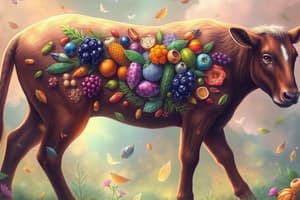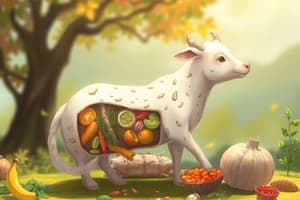Podcast
Questions and Answers
Which nutrient is responsible for providing energy and essential fatty acids for normal growth and development?
Which nutrient is responsible for providing energy and essential fatty acids for normal growth and development?
- Fats (correct)
- Carbohydrates
- Vitamins
- Proteins
What is the main function of proteins in living organisms?
What is the main function of proteins in living organisms?
- Provide hydration
- Regulate metabolism
- Serve as building blocks for tissues, enzymes, and hormones (correct)
- Provide energy
Which nutrient is classified as an organic compound and plays critical roles in growth, immunity, and metabolism?
Which nutrient is classified as an organic compound and plays critical roles in growth, immunity, and metabolism?
- Proteins
- Carbohydrates
- Vitamins (correct)
- Water
What is the primary function of carbohydrates in living organisms?
What is the primary function of carbohydrates in living organisms?
Which nutrient is responsible for maintaining fluid balance, bone strength, and nerve function in the body?
Which nutrient is responsible for maintaining fluid balance, bone strength, and nerve function in the body?
In terms of nutrients, what is the primary role of water in living organisms?
In terms of nutrients, what is the primary role of water in living organisms?
What is the main function of fiber in the diet?
What is the main function of fiber in the diet?
Why do humans need to obtain nutrients from foods that are easier to digest?
Why do humans need to obtain nutrients from foods that are easier to digest?
Which of the following nutrients is essential for cats but not for humans?
Which of the following nutrients is essential for cats but not for humans?
Why is taurine specific to cats and not essential for humans?
Why is taurine specific to cats and not essential for humans?
How does a balanced diet contribute to overall health?
How does a balanced diet contribute to overall health?
What is a key difference between humans and ruminant animals in terms of nutrient digestion?
What is a key difference between humans and ruminant animals in terms of nutrient digestion?
Flashcards are hidden until you start studying
Study Notes
Nutrition in Living Organisms: Animals and Humans
Nutrition is the process by which living organisms, including animals and humans, obtain and utilize essential substances to maintain their health and well-being. In this article, we'll delve into the specific nutrients that animals and humans require to thrive, how they obtain and use these nutrients, and the similarities and differences between their nutritional needs.
Common Nutrients for Animals and Humans
Living organisms need a variety of nutrients to survive, and while there are some differences between animals and humans, there are many nutrients that both share:
-
Water: Essential for hydration and maintaining cellular processes. Humans and animals require a daily intake of water through drinking or consumption of water-rich foods.
-
Carbohydrates: Energy-rich compounds, including sugars and starches, which are broken down to produce glucose during digestion.
-
Proteins: Composed of amino acids, which serve as the building blocks for body tissues, enzymes, and hormones.
-
Fats: Provide energy and essential fatty acids for normal growth and development.
-
Vitamins: Organic compounds that play critical roles in various body functions, including growth, immunity, and metabolism.
-
Minerals: Inorganic substances essential for the body's normal functions, such as maintaining fluid balance, bone strength, and nerve function.
-
Fiber: Indigestible carbohydrates found in plants that support healthy digestion and maintain gut health.
Differences in Nutrient Needs
While animals and humans share many nutrients, there are some key differences in their nutritional needs:
-
Nutrient sources: Humans can obtain nutrients from a wide variety of plant and animal sources, whereas the dietary preferences of animals are species-specific. For example, some animals are herbivores, others are carnivores, and still others are omnivores, each with different nutrient needs.
-
Digestive systems: Humans and animals have different digestive systems. For example, ruminant animals, like cows and sheep, have a four-chambered stomach that allows them to break down cellulose, a complex carbohydrate found in plant fibers. Humans do not have this ability and need to obtain nutrients from foods that are easier to digest, like grains and cooked vegetables.
-
Nutrient requirements: Some nutrients are essential for both animals and humans, while others are specific to certain species. For example, taurine, an amino acid, is essential for cats but not for humans.
The Importance of a Balanced Diet
A balanced diet is essential for the health and well-being of all living organisms. Humans and animals both require a variety of nutrients to maintain their bodies and support their daily activities. A balanced diet ensures that the body is getting all the necessary nutrients to support growth, development, and overall health.
Conclusion
While animals and humans share many nutrients and have similar nutritional needs, there are some key differences that stem from species-specific characteristics, dietary preferences, and digestive systems. Understanding these differences is crucial for ensuring that living organisms, including humans and animals, have access to the nutrients they need to thrive. By studying nutrition and its role in the lives of living organisms, we can better understand the complex interactions between our bodies, our food, and our environment.
Studying That Suits You
Use AI to generate personalized quizzes and flashcards to suit your learning preferences.



